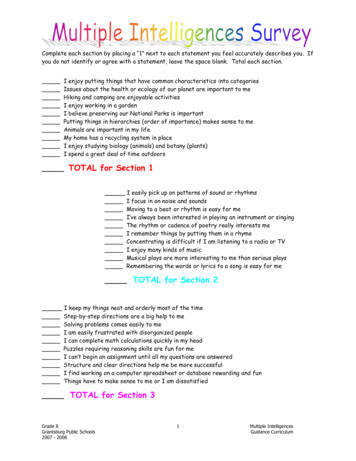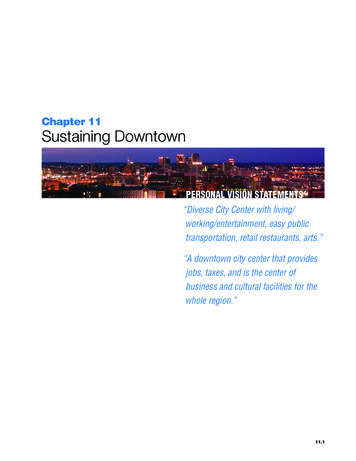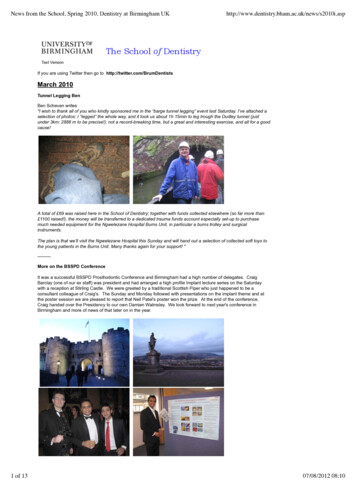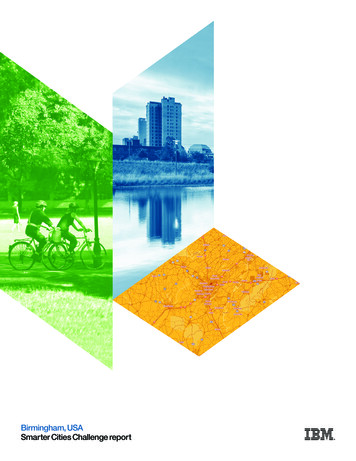
Transcription
Birmingham, USASmarter Cities Challenge report
Contents1. Executive summary 2. Introduction A. The Smarter Cities Challenge B. The challenge 3. Context, findings and roadmap A. Context and findings B. Roadmap 4. Recommendations Recommendation 1: Community Food Insecurity Task Force Recommendation 2: Information-sharing platform Recommendation 3: Community nutrition education Recommendation 4: Mobile food markets Recommendation 5: Optimized transit Recommendation 6: Birmingham Economic Action Authority Recommendation 7: Data-driven decisions 5. Conclusion 6. Appendix A. Acknowledgments B. Team biographies C. References 244566612121518222628313436363940
1. Executive summaryIntroductionThe City of Birmingham, Alabama, was one of 16 cities selectedto receive a Smarter Cities Challenge grant from IBM in 2014 aspart of the company’s citizenship efforts to build a Smarter Planet .During three weeks in July 2014, a team of five IBM experts workedto deliver recommendations on a key challenge identified by MayorWilliam A. Bell, Sr. and his senior leadership team: food insecurity.Much of the City of Birmingham suffers from limited access tosupermarkets, grocery stores and affordable healthy food options.In other words, they live in “food deserts.” The lack of high-qualityfood choices leads to major health problems for people in every agegroup and particularly for youth and the elderly in Birmingham’s mostimpoverished neighborhoods.The challengeToday in the U.S. the primary cause of food insecurity is economic.While the negative effects of economic disparity manifest themselvesin many ways, the one fact our government and citizens agree onis that there is no excuse for anyone to experience food insecurityin this prosperous nation. The IBM Smarter Cities Challenge teamlooked into many of the factors that contribute to food insecurity inBirmingham and developed a four-point framework to address thisissue. The four points are access, cost, education and communication.This document addresses potential solutions for the short term,medium term and long term to help eradicate food insecurity andfood deserts in Birmingham.During a three-week period in July 2014, a team of IBM executivesand experts worked with the City of Birmingham to develop theserecommendations, which are focused on improving economicdevelopment and reducing food insecurity in the city. The IBM teamconducted more than 70 interviews with a wide variety of stakeholders,including representatives from City government, the federal government,community organizations, nonprofit organizations, financial institutions,local businesses, the academic community and the faith-basedcommunity, as well as entrepreneurs, health professionals andconcerned citizens.Findings and recommendationsThe City of Birmingham has an illustrious history. Founded as anindustrial city in the age of coal and steel, Birmingham is a proud city,one that has experienced both glory and tragedy, tumultuous socialchallenges and inequities, and poverty and unemployment. Foodinsecurity is a problem of immense magnitude in Birmingham. It is achallenge that will require the entire community’s involvement to solve.To eradicate food insecurity, the City must build a strong foundationthat sets the stage for deliberate, focused, action-oriented solutionsthat fuse a number of critical factors: Community-wide response to the call for action Zeroing in on the root causes and effects of food insecurity Commitment to achieving the benefits of eradication Consolidated efforts across stakeholders to improve effectiveness Proven program management and subject matter expertiseThe IBM team recommends seven interrelated initiatives that togetherseek to overcome the complex underlying causes of food insecurity.Several short-term initiatives should result in immediate mitigation ofinsufficient access to healthy food. Implementation of a mobile foodmarket program, development of a portal on the City website to informcitizens of available healthy food and development of foundationalmetrics that inform stakeholders of resources and results shouldall help illuminate the opportunities and benefits of taking action.Incorporating a Community Food Insecurity Task Force will unite,integrate and coordinate current and future activities geared towardthe eradication of food insecurity.To build on the momentum of initial results, the IBM team proposesseveral broader solutions. Some should be initiated immediatelyso that the benefits, which may take longer to emerge, will occuras quickly as possible. The establishment of a data-driven decisionmaking capability — through a partnership between the City andUniversity of Alabama at Birmingham (UAB) stakeholders andinformed by a coalition of citizens and community leadership —is imperative. A data mart and analytics framework will provideCity leaders with dashboards to help evaluate the effectiveness offood access initiatives and identify problems, such as abandonedhousing, before they become critical. These tools will ultimatelyprovide a means to use hard data to inform decisions abouteconomic development, public safety, health and more.
Smarter Cities Challenge reportThe development of a comprehensive nutrition education effortfor youth and families can build on existing community efforts andinfrastructure as well as incorporate additional venues for sharinginformation, such as mobile food markets and web-based platforms.Structured expansion of healthy food education programs across theschool system (similar to current pilots) will educate the crucial K-12population of the city. The benefits of education should start accruingimmediately as communities become more aware of the value ofhealthy food distributed through mobile food markets and starttaking advantage of new information platforms.In the longer term, education should help empower families to insiston better-quality food and better access to it, creating demand formobile food markets and improved public transit. Our recommendationfor improving transit routes should enable underserved communitiesto benefit from more convenient and efficient access to healthy foodvenues. Extension of the City’s web-based outreach and communicationplatform would add mobile, text and voice channels for citizens to shareconcerns and questions and to receive updates about new healthyfood choices and programs. Enhancing data-driven decision makingacross the city will combine with electronic outreach to expandcommunity awareness of food insecurity and involvement with effortsto eradicate it. The Community Food Insecurity Task Force will helpcreate entrepreneurial opportunities to extend healthy food optionsand build awareness.The IBM team recommends the establishment of a consolidatedBirmingham Economic Action Authority that is chartered to improveeconomic vitality in the City of Birmingham. Its goal will be to attractprivate capital and business enterprises that can have a direct impacton food insecurity and help create a healthier city, as well as centralizeand galvanize the community. The Birmingham Economic ActionAuthority should improve awareness of the vision, goals and roadmapfor the city’s economic development as well as the vision outlined inthe City’s 2014 comprehensive plan. Sustainable economic developmentshould address food insecurity and the related issues of job creation andhousing. The Birmingham Economic Action Authority will be empoweredwith a bold, decisive action plan that has clear expectations for resultsand embraces a data-driven decision-making methodology.Whether the City succeeds in eradicating food insecurity dependson three underlying factors: managing change through committedleadership, remaining focused on a single vision and engaging thecommunity in significant ways with respect to both decision makingand implementation. The recommendations in this report, togetherwith effective foundational leadership and change managementcompetencies, represent an actionable roadmap the City ofBirmingham can follow to successfully eradicate food insecurity.ConclusionThe recommendations in this report include short-, medium- andlong-term suggestions to resolve the many factors that contributeto food insecurity. Although the IBM team aligned and consolidatedthese recommendations, the citizens of Birmingham provided theimagination, creativity and commitment to begin solving the problemof food insecurity and economic disparity.The Smarter Cities Challenge team would like to thank MayorWilliam A. Bell, Sr., his administration, the Birmingham City Council,the University of Alabama at Birmingham and all of the public andprivate stakeholders with whom we spoke for providing the insightand perspective necessary to create this report.Highlights Birmingham faces serious economic challenges caused by theloss of key sustaining industries during the last several decades. The loss of key industries has affected neighborhoods acrossthe city, causing the closure of full-service grocery stores andmarkets and reducing access to healthy, nutritious food. Less access to healthy food is affecting citizen health,as demonstrated by an increased incidence of diabetes,obesity, asthma and heart disease. The top three food deserts in the city also have the lowestlife expectancy; in some cases up to 20 years less than areasof the city not affected by food insecurity. Negative health outcomes strain both families and health services. Although multiple stakeholder groups recognize the problemof food insecurity, there is a lack of communication andcoordination among these groups and no systematicapproach to measuring progress. Eradicating food insecurity requires a coordinated solutionset capable of delivering results in the short term (immediateaccess to food), medium term (education and data-drivendecision-making framework) and long term (sustainedeconomic development).3
2. IntroductionA. The Smarter Cities ChallengeBy 2050, cities will be home to more than two-thirds of the world’spopulation. They already wield more economic power and haveaccess to more advanced technological capabilities than ever before.Simultaneously, cities are struggling with a wide range of challengesand threats to sustainability in their core support and governancesystems, including transport, water, energy, communications,healthcare and social services.Meanwhile, trillions of digital devices, connected through theInternet, are producing a vast ocean of data. All of this information— from the flow of markets to the pulse of societies — can be turnedinto knowledge because we now have the computational power andadvanced analytics to make sense of it. With this knowledge, citiescould reduce costs, cut waste and improve efficiency, productivity andquality of life for their citizens. In the face of the mammoth challengesof economic crisis and increased demand for services, ampleopportunities still exist for the development of innovative solutions.In November 2008, IBM initiated a discussion on how the planet isbecoming “smarter.” By this it meant that intelligence is becominginfused into the systems and processes that make the worldwork — into things no one would recognize as computers: cars,appliances, roadways, power grids, clothes and even natural systems,such as agriculture and waterways. By creating more instrumented,interconnected and intelligent systems, citizens and policymakerscan harvest new trends and insights from data, providing the basisfor more informed decisions.A Smarter City uses technology to transform its core systems andoptimize finite resources. Because cities grapple on a daily basiswith the interaction of water, transportation, energy, public safety andmany other systems, IBM is committed to a vision of Smarter Cities as a vital component of building a Smarter Planet. At the highestlevels of maturity, a Smarter City is a knowledge-based system thatprovides real-time insights to stakeholders and enables decisionmakers to manage the city’s subsystems proactively. Effectiveinformation management is at the heart of this capability, andintegration and analytics are the key enablers.Intelligence is being infused into the way the world works.The IBM Smarter Cities Challenge contributes the skills and expertiseof top IBM talent to address the critical challenges cities around theworld now face. We do this by putting teams on the ground for threeweeks to work closely with City leaders and deliver recommendationson how to make the City smarter and more effective. Over the past fouryears, more than 100 cities have received these grants. The SmarterCities Challenge is the largest philanthropic initiative IBM has launched,with contributions valued at more than 50 million to date.The City of Birmingham, Alabama, was selected through acompetitive process as one of 16 cities to be awarded a SmarterCities Challenge grant in 2014.During a three-week period in July 2014, a team of five IBM expertsworked in Birmingham to deliver recommendations around keyissues for Mayor William A. Bell, Sr.InstrumentedInterconnectedIntelligentWe can measure, senseand see the condition ofpractically everything.People, systems and objects cancommunicate and interact withone another in entirely new ways.We can analyze and derive insight fromlarge and diverse sources of informationto predict and respond better to change.Figure 1: Instrumented, interconnected, intelligent
Smarter Cities Challenge reportB. The challengeThe City of Birmingham has experienced a significant populationdecline over the course of several decades and needs to reestablishstable and growing neighborhoods with access to high-quality goodsand services. Birmingham blossomed from its inception in 1880 toreach a population of 340,000 in 1960. Since that time, however, theCity has lost 128,000 residents (or 38 percent of its population). As manyindustries shuttered factories and other facilities in Birmingham, theworkforce becam
Birmingham and developed a four-point framework to address this issue. The four points are access, cost, education and communication. This document addresses potential solutions for the short term, medium term and long term to help eradicate food insecurity and food deserts in Birmingham. During a three-week period in July 2014, a team of IBM executives and experts worked with the City of .
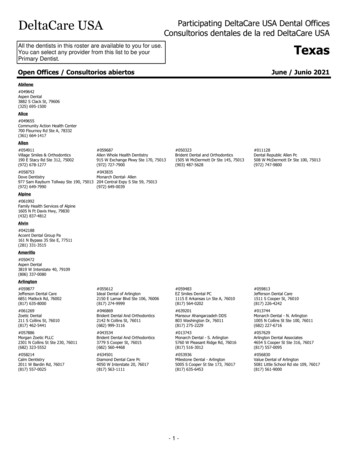


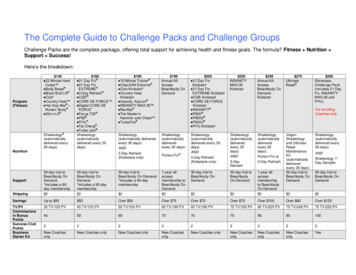


![Letter from Birmingham Jail (1963) [Abridged]](/img/2/1963-mlk-letter-abridged.jpg)
